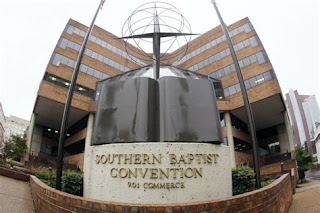Robert Downen and John Tedesco
Houston Chronicle
Originally posted 22 MAY 22
For 20 years, leaders of the Southern Baptist Convention — including a former president now accused of sexual assault — routinely silenced and disparaged sexual abuse survivors, ignored calls for policies to stop predators, and dismissed reforms that they privately said could protect children but might cost the SBC money if abuse victims later sued.
Those are just a few findings of a bombshell, third-party investigation into decades of alleged misconduct by Southern Baptist leaders that was released Sunday, nearly a year after 15,000 SBC church delegates demanded their executive committee turn over confidential documents and communications as part of an independent review of abuse reports that were purportedly mishandled or concealed since 2000.
The historic, nearly 400-page report details how a small, insular and influential group of leaders “singularly focused on avoiding liability for the SBC to the exclusion of other considerations” to prevent abuse. The report was published by Guidepost Solutions, an independent firm that conducted 330 interviews and reviewed two decades of internal SBC files in the seven-month investigation.
“Survivors and others who reported abuse were ignored, disbelieved, or met with the constant refrain that the SBC could take no action due to its (structure) — even if it meant that convicted molesters continued in ministry with no notice or warning to their current church or congregation,” Guidepost’s report concluded.
Guidepost investigated the SBC’s 86-member executive committee, the convention’s highest governing entity. The firm’s investigators had unprecedented access to the SBC’s leadership and reviewed thousands of internal documents — including previously confidential communications between SBC lawyers.
The investigation sheds new and unprecedented light on the backroom politicking and deceit that has stymied attempts at reforms and allowed for widespread mistreatment of child sexual abuse victims. And it exhaustively corroborates what many survivors have said for decades: that Southern Baptist leaders downplayed their own abuse crisis and instead prioritized shielding the SBC – and its hundreds of millions of dollars in annual donations — from lawsuits by abuse victims.
Among the findings:
A small group of SBC leaders routinely misled other members of the SBC’s executive committee on abuse issues, and rarely mentioned the frequent and persistent warnings and pleas for help from survivors.
- Fearing lawsuits, leaders similarly failed to inform the SBC’s 15 million members that predators and pedophiles were targeting churches.
- Longtime SBC leaders kept a private list of abusive pastors and ministers despite claiming for years that such an idea was impractical for stopping predators and impossible to adopt because of the SBC’s decentralized structure. Compiled since 2007, the roster contained the names of 703 offenders, most with an SBC connection. A few still work at churches in the SBC or other denominations.
- Former SBC President Johnny Hunt is accused of sexually assaulting a woman weeks after his presidential tenure ended in 2010. The woman said Hunt manipulated her into silence by saying a disclosure of the incident would harm the SBC’s churches. Four other people corroborated much of the woman’s allegations to Guidepost. Hunt denied the allegations, but resigned from the SBC’s North American Mission Board days before the report was published.


